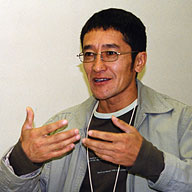An Interview with Temirbek Birnazarov
The Pleasure of Ordo—Bewitching Game and Jovial People

About the filming of Ordo
Ordo is the national sport of Kyrgyzstan, but it is only played in the regions of Narin, where I am from, and Talas. One of my life projects is shooting my hometown, the stage for this film. I’d always used film, but this time I had a hard time raising funds so it ended up being a video shoot. This time I received financial support from a friend from my school days in Kazakhstan. Almost all my energy went into raising funds. In my country it is economically very difficult to make films. The country is poor, but tradition is valued, so I thought I’d like to film the game of ordo that is passed down in the area. My co-director Emil set the length of the finished piece at twelve minutes. I would have been fine with ten or eight minutes.
The people who play ordo
Just as I was looking for a place where ordo was being played in the Narin region, I happened upon a game. At first I wanted to film about the game of ordo, but gradually my interest shifted to the people enjoying the game. People from Narin readily express their feelings and seem kind of uncultured, but inside they are very upright and pure hearted, and tend to be easily cheated. I’m from Narin, so I would hang around the game, cheer loudly and feel like I was forgetting to film. The bag that appears in the film contains a chicken, but this isn’t the prize for the game. Someone on his way to sell the chicken at the market passed by and ended up joining the game, and the chicken was neglected. Everyone wants to join in.
About the game ordo
The bones are from a sheep, and color is added using dying material like yarn. In the village there’s a person who keeps all the bones together. Sometimes a sheep is used as the prize. Because there are lots of sheep. Unfortunately, I’ve never won a prize. As a child, I often played a game that uses bones resembling ordo, but I never won. The rules are complicated and take a month just to learn. Like you can’t drop your hat while bending forward, or you can’t turn your back on the pile of bones. It takes a lifetime to be able to hit the mark, but I’d be happy if it caught on in Japan.
Future plans
I plan to film the village where I’m from. About thirty households live in a small village, where children of different ages study together in the same classroom. It’s a village without any newspapers, but everyone enjoys their lives. I wouldn’t say everything is good, but the advantage is that there hasn’t been negative influence from the outside. Some young people who left the village for the city returned two or three years later, so I asked them why and they replied it’s because they feel the important things are being lost in the city. I’d like to film the lives of village people living in harmony with nature.
Involvement with Japan
In Kyrgyzstan, Murakami Haruki and Matsuo Basho are well known. Recently Kinoshita Junji’s Yuzuru was screened, and in Bishkek there are special screenings of Japanese films. I stage directed a work by Ihara Saikaku. I’d also like to study Kabuki, Noh and other Japanese traditional arts. Also, I want to screen a series of Kyrgyzstan films in Japan.
(Compiled by Kato Hatsuyo)
Interviewers: Kato Hatsuyo, Kurokawa Michiko / Interpreter: Kohara Shiho
Photography: Kurokawa Michiko / Video: Kato Takanobu / 2003-10-12
